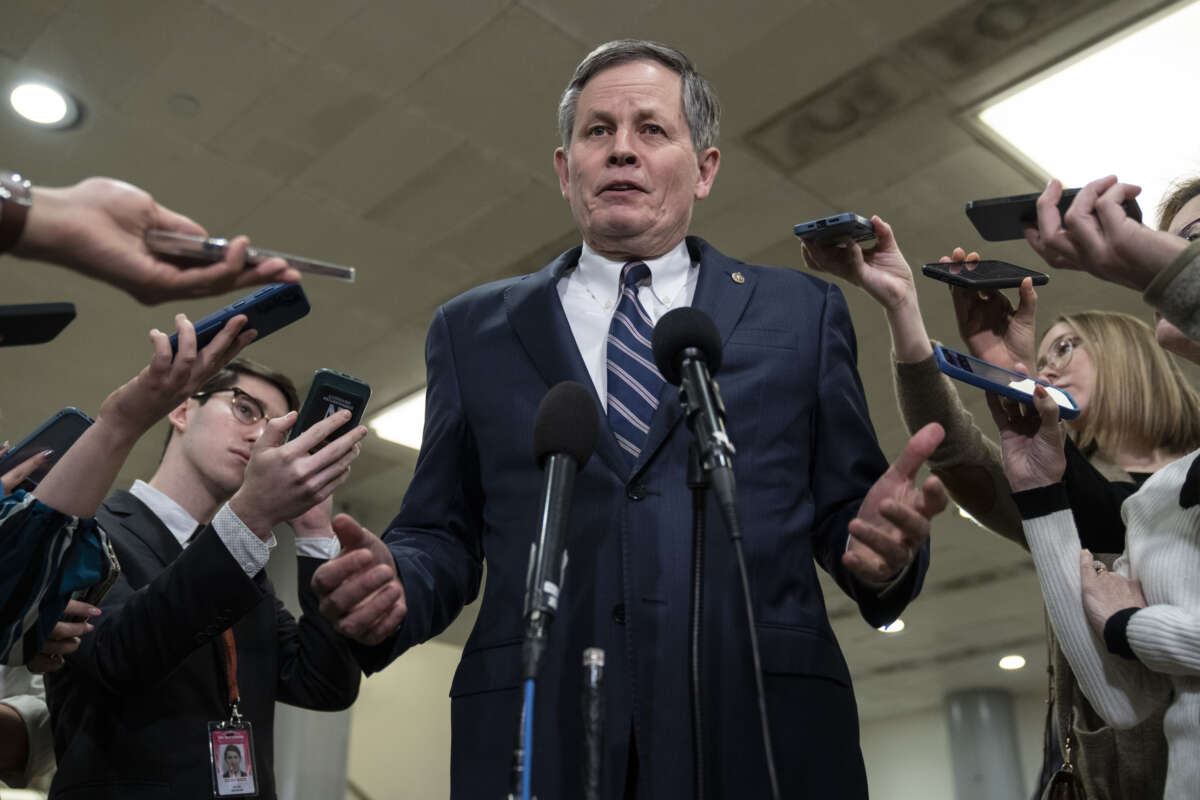Support justice-driven, accurate and transparent news — make a quick donation to Truthout today!
As the Republican Party veers further into fascism, the party is facing an election fundraising problem: Democrats in competitive Senate races are consistently outraising Republican candidates, and the party has lost control of the chamber.
The party’s solution? Turning to ultra-rich candidates who can afford to fund their own campaigns, according to new reporting from Politico, after the party has spent years slashing taxes for those same ultra-rich individuals.
As Politico’s Ally Mutnick reported this week, Republicans are considering running at least 10 extremely wealthy candidates across over a half dozen swing states, including places like Arizona, Michigan, Ohio, Pennsylvania and Wisconsin. Sen. Steve Daines (Montana), chair of the National Republican Senatorial Committee, the GOP’s Senate candidate fundraising arm, is reportedly emphasizing recruiting self-funded candidates or looking for candidates who are talented at fundraising.
Because candidates are allowed to contribute unlimited amounts of money to their own campaigns, running wealthy candidates is a way to get around campaign contribution limits that otherwise restrict — albeit somewhat ineffectively — the amount of money that rich donors can contribute directly to campaigns.
Both major parties have made use of self-funding candidates before; Donald Trump is a famous example of someone who self-funded their candidacy. But the tactic “has taken on increasing importance” with Republicans having been outraised by Democrats in Senate races in the last two election cycles, Mutnick wrote.
“In politics as in life, money doesn’t buy happiness, but poverty doesn’t buy a damn thing,” Sen. John Neely Kennedy (R-Louisiana), told Politico. “So if you’ve got a candidate who can self fund, you can spend your money elsewhere.” He added, “Democrats are always going to outraise us.”
Potential candidates include people like Eric Hovde, the CEO of a real estate company and a $1.4 billion bank holding company, in Wisconsin; West Virginia’s richest man, Gov. Jim Justice, a coal baron; David McCormick, the former CEO of the world’s largest hedge fund Bridgewater Associates, in Pennsylvania; and former owner of a string of car dealerships in Michigan, Kevin Rinke.
Several of these potential candidates have run and lost previous bids for various offices after injecting millions of their own funds into those runs. Some of them have been courted by the NRSC to run because of their wealth.
These ultra-wealthy Republicans have held varying views in terms of their actual politics, agreeing generally on their contempt for the poor, but slightly disagreeing about Donald Trump’s Big Lie that the 2020 election was stolen, for instance. What these candidates have in common is their wealth: wealth that has been majorly bolstered by Republican efforts to slash taxes for the ultra-rich in the past years.
Republicans and conservative Democrats have spent decades skewing the tax code in favor of the rich. The most blatant recent example of this was the party’s 2017 Tax Cuts and Jobs Act, a Donald Trump-era bill overhauling the tax code to give yet more massive tax cuts to corporations and the wealthy that the GOP is now trying to make permanent.
These efforts appear to now be perpetuating a cycle that not only allows the rich to have more influence on elections than ever before — largely benefiting Republicans — but also allows them to run for office based on their wealth, taking even more influence out of the hands of the public and further empowering the wealthy.
In other words, if Citizens United is allowing the rich to have huge influence over elections, tax cuts for the wealthy and the continued funneling of money from the working class to the richest Americans are allowing the rich to completely control some campaigns and elections. An increased reliance on self-funded candidates could even further entrench the growing grip of the ultra-rich on elections.
A terrifying moment. We appeal for your support.
In the last weeks, we have witnessed an authoritarian assault on communities in Minnesota and across the nation.
The need for truthful, grassroots reporting is urgent at this cataclysmic historical moment. Yet, Trump-aligned billionaires and other allies have taken over many legacy media outlets — the culmination of a decades-long campaign to place control of the narrative into the hands of the political right.
We refuse to let Trump’s blatant propaganda machine go unchecked. Untethered to corporate ownership or advertisers, Truthout remains fearless in our reporting and our determination to use journalism as a tool for justice.
But we need your help just to fund our basic expenses. Over 80 percent of Truthout’s funding comes from small individual donations from our community of readers, and over a third of our total budget is supported by recurring monthly donors.
Truthout has launched a fundraiser, and we have a goal to add 200 new monthly donors in the next 24 hours. Whether you can make a small monthly donation or a larger one-time gift, Truthout only works with your support.
